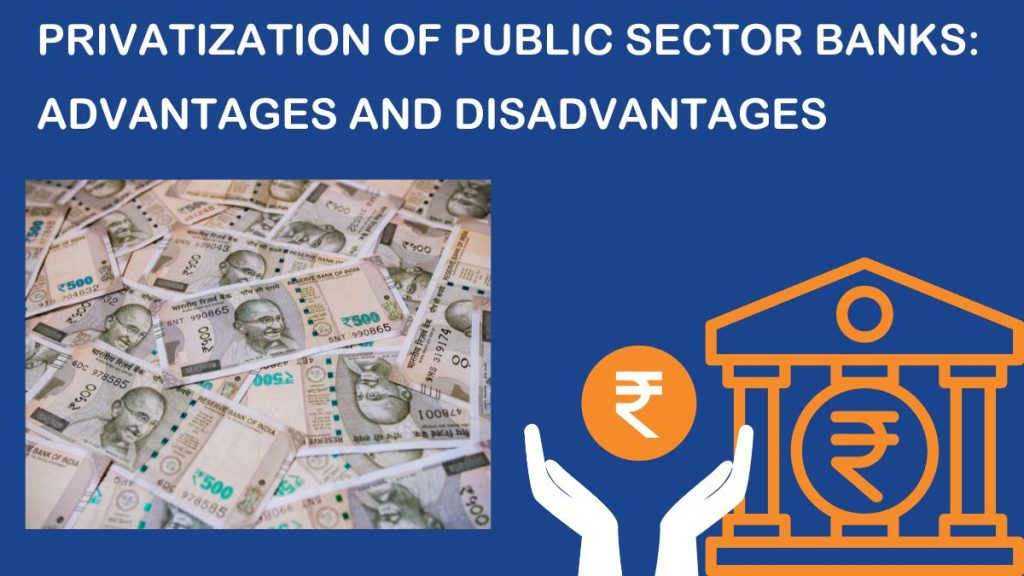The issue of privatization of public sector banks (PSBs) has been on the rise in India. With the government looking to cut its presence in banking and encourage a more robust private sector, this issue has become more pertinent than ever before. But is privatization the way forward? What are its advantages and disadvantages? Let’s dissect it in simple terms.

Why is Privatization Being Discussed?
Public sector banks dominate the Indian banking system. They control a major chunk of the market, provide financial support to rural areas, and drive economic development. But over the years, issues like rising non-performing assets (NPAs), inefficiency, poor management, and government interference have raised concerns.
To address such issues, the government has been recapitalizing banks, consolidating weaker ones with stronger ones, and now contemplating privatization as a lasting solution. Private ownership is envisioned to introduce efficiency, good governance, and shift the financial strain off the government.
But is privatization necessarily a magic wand? Let us balance the positive and negative sides.
Advantages of Privatization of Public Sector Banks
1. Greater Efficiency and Responsibility
Private banks are performance- and profitability-oriented. They have clearly set objectives and rigid accountability. Government support in PSBs tends to result in laxity, while private ownership has the potential to infuse a culture of responsibility and customer-oriented service.
2. Improved Customer Service
Most individuals have grievances against slow service, inordinate delays, and bureaucratic complications in public sector banks. Privatization has the potential to compel banks to enhance their service, implement new technology at a quicker pace, and make banking more convenient.
3. Lower Burden on Government Exchequer
The government has to inject crores of rupees every few years to rescue struggling PSBs. This is taxpayers’ money. Privatization can ease this financial burden and enable the government to utilize funds for other vital sectors such as health and education.
4. More Competitive Banking Sector
Currently, most PSBs are unable to compete with private sector banks such as HDFC, ICICI, and Axis Bank. If more public sector banks are privatized, it may result in healthy competition, improved banking products, and enhanced financial services to customers.
5. Reduced Political Interference
One of the problems with PSBs is that they tend to get political pressure to lend money to some sectors or companies, even if it’s not economically justified. Privatization can make banks take credit decisions based on merit and not political considerations.
Disadvantages of Privatization of Public Sector Banks
1. Financial Inclusion Could Suffer
Public sector banks are key players in the cause of financial inclusion. They cater to rural regions, small and medium enterprises, and weaker sections of society, which the private banks find unprofitable. If banks are privatized, they may cater only to urban and high-value customers and leave rural India behind.
2. Risk of Job Losses
PSBs hire lakhs of individuals. Job losses, dismissal, and reorganization frequently follow privatization. If the private owner cuts personnel to make banks more efficient, numerous staff could be faced with job instability as well as cuts in facilities and benefits.
3. Risk of Monopolization
A few large private players, should they gain dominance over public sector banks, risk market concentration. This undermines competition and might even result in customers paying a price for the luxury of more fees by the banking industry.
4. Profit-Based System Can Be a Cause of Concern
In contrast to public banks that focus on social welfare, private banks are based on profits. Therefore, small entrepreneurs, farmers, and economically weaker sections may not get easy loans since private banks will target high-net-worth individuals and large corporations more.
5. Security of Public Deposits
Individuals trust PSBs since they are aware the government will intervene in case anything goes wrong. With private sector ownership, banks can always risk collapsing because of mismanagement or financial scams, as in instances such as Yes Bank and PMC Bank.
Is Privatization the Only Answer?
Privatization is advantageous, but not the sole option to enhance the banking sector. Some experts opine:
Improved governance changes in PSBs rather than privatising them entirely.
Minimizing political interference in lending.
Tougher legislation for recovery of loans to tackle increasing NPAs.
Promoting public-private partnerships (PPPs) to deliver efficiency without compromising financial inclusion.
The government must balance reforms in PSBs with the fact that the common man should not be put in trouble due to privatisation.
Final Thoughts
Privatization of public sector banks is a two-edged sword. On the one hand, it could introduce efficiency, improved customer service, and lighter financial burden on the government. On the other hand, it could impact financial inclusion, cause people to lose jobs, and make banking costly.
The solution lies in gradual reform and not sudden privatization. Public banks need to be strengthened, professional management needs to be introduced, and fair competition in the banking industry could be ensured. This could be a more balanced solution.
What’s your opinion? Should public sector banks be privatized entirely, or is there a better solution to correct the system?
At ixamBee, we specialize in providing comprehensive online courses for government exams and online courses for government jobs. Our expertly designed courses for government jobs cater to a wide range of upcoming government exams. Whether you’re preparing for specific courses for government exams or seeking general guidance, ixamBee offers the resources like Beepedia previous year papers, SSC CGL, SSC CHSL, SSC MTS and other mock tests to succeed in exams like RBI Grade B, SEBI Grade A, NABARD Grade A, RRB NTPC, SSC MTS, NIACL Assistant, and more.
Also Read: